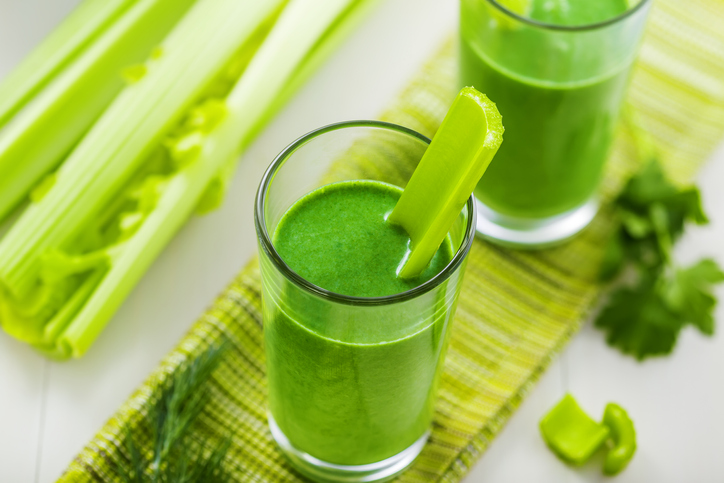Celery juice is a growing trend in the wellness world. There are claims that it does everything from lowering inflammation to helping people lose weight. But despite the praise as a “miracle cure-all” drink, lack of evidence suggests otherwise. So, how do we know what’s true?
Celery Juice Claims and Misunderstandings
Many people are jumping on the celery juice trend because celebrities claim it’s a super drink. It’s said that celery juice, which is made by blending and straining celery, can:
- Help with acid reflux
- Help with weight loss
- Reduce inflammation
- Treat high blood pressure
- Clear acne
- Lower cholesterol
While this isn’t the full list, it’s easy to see why the green drink is being touted as a miracle beverage. But while there is plenty of research that supports the benefits of celery, the benefits of juicing the non-goitrogenic vegetable have almost no supporting data. Some experts say that juicing celery — or any vegetable — doesn’t boost its health properties. In fact, it strips away other important compounds.
Can Celery Juice Help You Lose Weight?
When celery is blended and strained, it removes the fiber, which is critical for good gut health. Fiber takes longer to digest, so it gives more energy and keeps your appetite at bay. Fiber can also help with:
- Reducing the risk of type 2 diabetes and heart disease
- Weight loss
- Balancing cholesterol levels
- Feeling full
- Balancing blood sugar levels
- Boosting your immune system
Because of the lack of fiber, it’s less filling and can intensify cravings, which certainly doesn’t help if you’re trying to lose weight.
Balance Blood Sugar Levels?
According to the Cleveland Clinic, the sugar in celery becomes concentrated when it’s juiced. Many store-bought brands are mixed with other juices and additives so it tastes better, but also jacks up the sugar content. So, by increasing sugar and taking away fiber, you may actually be harming your blood sugar levels.
How About Lowering Inflammation?
While celery itself helps with inflammation, there is no evidence that suggests the juice does. There are studies that support how celery can help reduce inflammation, but it’s unclear if celery juice can. Celery juice has phytochemicals called flavonoids, which are antioxidants that help control inflammation. When the fiber is removed, though, many of these phytochemicals are also removed. Not enough research has been done on humans to demonstrate how active these flavonoids are.
Do You Need it to Detox?
Because of some rave reviews, celery juice has made its way into the detox world. It’s said to be able to cleanse your system of toxins and improve liver function. But, in reality, drinking any juice or potion won’t fix or enhance your liver; it works just fine on its own. Jacklyn London, a registered dietitian with the Good Housekeeping Institute’s Nutrition Lab, wrote that drinking juice to help your liver is, “a bit like telling someone how to do their job — albeit, incorrectly.”
So, Should You Give it a Try?
If you’re thinking about adding celery juice to your diet, be sure to look into it before trying it. Little to no evidence backs up the miraculous claims. While it does contain most of the vitamins and minerals that celery has, including vitamin K, vitamin A, potassium and folate, it can have more concentrated sugar and no fiber. If celery juice is added to a healthy diet, it may contribute to good overall health. But you shouldn’t drink it because you think it’s going to fix or prevent certain medical issues.



